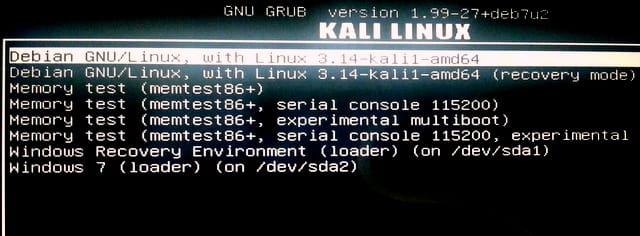

- #Grub display menu how to
- #Grub display menu install
- #Grub display menu driver
- #Grub display menu download
- #Grub display menu windows
The 3 option tells GRUB that it must wait 3 seconds before automatically booting the default operating system kernel, so the user has enough time to e.g. Being able to temporarily edit the GRUB command line on startup is also important for testing and debugging… to do so grub2 must show up instead of instantly booting. The menu option tells GRUB that it must create and show a menu when the computer is started or restarted. If you are using Legacy BIOS, you can display it by pressing the Shift key several times when booting.
#Grub display menu driver
Changing the boot parameters is especially important: I use a GCN 2.0 AMD graphics card, because the amdgpu driver isn’t enabled by default on GCN < 3.0 cards I need to add radeon.si_support=0 radeon.cik_support=0 amdgpu.si_support=1 amdgpu.cik_support=1 otherwise I’ll be put on the deprecated radeon module instead of amdgpu. If the GRUB menu doesn’t show up when you boot your computer, it may be hidden. Speaking of the boot loader: One thing that worries me is that there’s no GUI to customize it, such as setting the grub theme or default boot parameters.

Create or resize any image to to the appropriate size. Determine the resolution you will use for the GRUB 2 splash image. As you can see below in the image, there are two additional options for every kernel: upstart and recovery. If you don’t select an option, the first displayed kernel will load by default. In the menu, you should see various kernels options you choose. Wait until the UEFI/BIOS has finished loading, or has almost finished. After you select the Advanced options for Ubuntu, a Ubuntu GRUB menu will show up. When the computer is booting up and shows the logo of the manufacturer, quickly press F10/F12 or F2. Using the up and down arrow keys allows you to select the desired kernel and pressing the Enter key continues the boot process using the selected kernel. In Ubuntu, refer to the Display in DASH or via the System, Preferences, Display menu for available monitor resolutions, or run vbeinfo in the GRUB 2 terminal to display the resolutions available it. Why is GRUB menu not showing when starting my computer Switch on your computer. However this system is rendered useless by the fact that you can’t choose which one to boot: The latest kernel is always loaded when the OS starts, the default setup doesn’t present any options when the machine is powered on! If you can maintain multiple kernels, shouldn’t the bootloader let you select them, while of course defaulting to the latest version? The function of the GRUB menu is to allow the user to select one of the installed kernels to boot in the case where the default kernel is not the desired one.
#Grub display menu install
On other distributions, look up Grub Customizer in your package manager, or see the instructions for building the application from source.I like the idea behind the kernel manager, which lists available kernels and lets you install or remove any version.
#Grub display menu download
You can also download (scroll down for the latest version) the Grub Customizer DEB package without adding the PPA. To set a higher timeout, use something like GRUBHIDDENTIMEOUT5 GRUB will display an empty screen or splash screen for five seconds, during which you can press any key to view the menu.
#Grub display menu how to
It will also show how to add operating systems and how to add splash screens. But as soon as you have more options, it is going to show up. (Manjaro) in grub, it is not going to show up by default. Making grub menu visible at the boot and adding windows.
#Grub display menu windows
After making any changes to your GRUB boot menu with Grub Customizer, remember to click the Save button to save the configuration and generate a new grub.cfg. In the /etc/default/grub file, set the GRUBTIMEOUTSTYLE to menu or countdown. This tutorial describes how to edit the GRUB menu. I want to add Windows to grub menu and make the menu visible at startup.


 0 kommentar(er)
0 kommentar(er)
